- photo contests ▼
- photoshop contests ▼
- Tutorials ▼
- Social ▼Contact options
- Stats ▼Results and stats
- More ▼
- Help ▼Help and rules
- Login
5 Popular Online Color Tools Compared And Analyzed
As a CG artist or designer, you’ve likely run into the need to pick colors for your work. It may be difficult to approach the vast color space without some training or some help. You can buy color books, read about color theory, and try to imitate schemes that already work. However, with the rapid advancement of web applications today, there are color tools available to every designer that are fast, useful, and completely free.
Just as there are a variety of artistic software applications out there, with their own pluses and minuses, color tools, too, have their good and bad points. It’s best not to commit to one particular tool, as some features are unique to certain applications. Keep that in mind so you know what tool to use and when to use it.
ColourLovers
Colour Lovers is a fantastic resource for colors. Users can build palettes (a.k.a. “schemes”), create patterns, or mix their own colors. Since there is a large social element to the site, useful palettes usually become very prominent and it’s easy to find a good palette to use for your next project. ColourLovers has several benefits. It has garnered a large, active community that constantly seeks out new color trends. This sort of public service is invaluable to any designer stuck without ideas. The tools supplied by ColourLovers are extremely useful and, best of all, they don’t require Flash. The “trends” section is also a unique and helpful section of the site, where modern websites’ color schemes are analyzed and shared. ColourLovers also includes a sophisticated color picker tool named COPASO, which rivals Kuler and Color Scheme Designer. There are some drawbacks, however. The site is noticeably slow at times. This isn’t a big deal when there are no deadlines, but working in real time with a client can be frustrating if the tools used take more time than is acceptable. The site is also full of useless color schemes, which were obviously made to be pleasant to color junkies, but not useful for production. It will take a newcomer a few visits before he/she recognizes how to separate the wheat from the chaff.Kuler
Adobe Kuler is a heavyweight color tool with several useful features. There is a social element to the site, but it’s not as large as ColourLovers. Kuler definitely makes color-picking stylish. The site is all Flash, so you’ll see a lot of transitions and complex gadgetry. It’s apparent that Kuler was made for professionals: when you create a new color schemes, you’ll get color values in several color spaces: HSV, RGB, CMYK, and LAB. Features like these make Kuler suitable for multi-media work, such as transferring print colors to the web, or vice-versa. No other tool makes this as easy and straightforward. Kuler doesn’t have much in the way of problems, except that it still feels like a work in progress. It seems possible that Adobe can create a much more potent color scheme tool than Kuler already has. However, they’ve decided to stick to boring basics, which won’t necessarily produce winning schemes. For a starting point, Kuler is a great tool, but for finishing touches, it feels too much like training wheels.Color Scheme Designer
Color Scheme Designer has basic features down pat, but it also offers a few unique abilities that other tools would do well to imitate. Though its color picker is no more interesting than Kuler’s, its scheme visualization is one-of-a-kind. Designers can preview how a hypothetical website may look with the set color scheme. This is a unique and useful feature that allows designers to immediately see a practical realization of their scheme ideas. Color Scheme Designer is a solid alternative to Kuler. Its scheme preview function is helpful, and it can export schemes to HTML, XML, text, or Photoshop/GIMP palette files. It’s continuously updated by its sole developer, so more features may be added with time. Unfortunately, Color Scheme Designer doesn’t offer that much more in terms of color picking. It’s a great tool to use in a practical setting, with its export functionality, but as soon as one needs a color scheme tool that doesn’t rely on basic color combinations, it fails to foot the bill. Consider it a helpful alternative, but not a good standalone tool.Color Combos
Color Combos takes a much more practical approach to picking color schemes. There are no “analogous” colors here, just the colors you pick. The Combo Tester tool makes testing several colors side by side a breeze. There’s an enormous library of previously designed color combinations which you can start working with immediately. Color Combos shows that color tools don’t need to be developed in Flash and don’t need to be fancy to be useful. The spartan layout provides an accessible and liberating environment for color scheme generation. Small, but necessary, features like random combos and complementary scheme generation make this a great tool for considering a global color scheme for a new project. No other tool on the list provides such immediate feedback. The drawback of Color Combos is apparent: color selection is entirely up to the designer. Preset combos can be helpful as a starting point, but there’s no algorithm to help speed up scheme generation and one may spend an hour or longer agonizing over schemes in the tester. It’s a good idea to use the site as a testing ground for an already-conceived scheme, instead of one that’s yet to be created.ColorSchemer
Heading up the end of the list, ColorSchemer is a tool unlike any of the ones presented so far. It’s utilitarian and compact and, for the most part, an advertisement for the payware that the site owners sell. There are a couple of immediate uses for ColorSchemer, namely laying out potential colors to work with and quickly generating hexadecimal colors from RGB values or vice versa. ColorSchemer has an interesting twist on scheme generation. Users can click on any color in the scheme to set it as the base and a whole new array of 16 colors related to the base color will be generated. This is very useful for illustrations and color bursts, where related colors may be obvious, but the particular shade might be too unnatural. ColorSchemer makes generating related colors absolutely simple. The flip side of ColorSchemer is that it’s of no use in almost anything else. It doesn’t incorporate (or at least doesn’t disclose its use of) color theoretic constructs and the majority of the time spent using it consists of re-generating schemes. Unless the user approaches it with an exact outcome in mind, it’s a tool best left for experimentation. For more useful tools, check out our online color tools resource section.Howdie stranger!
If you want to participate in our photoshop and photography contests, just:
LOGIN HERE or REGISTER FOR FREE
-
says:
-
says:
I always use Kuler, never even heard of the other… will give them a try for sure…some neat features for some.
( 2 years and 4955 days ago ) -
says:
Thanks, nice compilation and reviews…
( 2 years and 4955 days ago ) -
says:
@ Darius, please take care of that speed issue, you really have an amazing tool there… the speed is stopping me from using it…
( 2 years and 4955 days ago ) -
says:
@Darius: I included COPASO in the post, but I have to say it’s not obvious that such a great feature exists on CL. Promoting it would be a good idea.
@Chris and Kuler: Thank you for the feedback 🙂
( 2 years and 4955 days ago ) -
says:
Thanks, didn’t know there were so many :!!
( 2 years and 4954 days ago ) -
says:
Good…
( 2 years and 4952 days ago ) -
says:
Oh boy, I’ve got a lot to learn about the color theory – I didn’t even know there were such useful tools!
( 2 years and 4952 days ago ) -
says:
I swear I would be lost without Kuler
( 2 years and 4952 days ago ) -
says:
Where is the comparison?
( 2 years and 4952 days ago ) -
says:
I’m working with adobe kuler or colourlovers. Will try others
( 2 years and 4952 days ago ) -
says:
Kuler is like the best! used it a couple times while trying to choose color combo for web design :o)
( 2 years and 4952 days ago ) -
says:
Great idea. I’ve used ColorLovers for some time, will check out the others too. Seems like peeps like the Kuler one a lot; checking that out first!
( 2 years and 4952 days ago ) -
says:
My favorite tool to use for quick color scheme comparison is the colorjack sphere.
http://www.colorjack.com/sphere/
It’s not a complete community like colorlovers, but I find it to be the fastest way to pick out a colorscheme if I already have a base color to start from.
( 2 years and 4952 days ago ) -
says:
Really nice post! I am always having trouble choosing the right colors for a new design or mockup, so these will definitely come in handy. Thanks!
( 2 years and 4951 days ago ) -
says:
Thanks 🙂
( 2 years and 4951 days ago ) -
says:
Great post! I always have trouble finding colors.
( 2 years and 4949 days ago ) -
says:
really usefull tools, solved the problem of picking colors
( 2 years and 4943 days ago ) -
says:
Thanks for great article. I’ve been looking this for a long time..
( 2 years and 4873 days ago )
I found a article like this. Check this..
http://www.ueuh.com/internet/20-color-combinations-tool/ -
says:
Thanks for sharing! Take a look at this color tool too http://approsto.com/color-picker/
( 2 years and 3841 days ago ) -
says:
Another great resource for colors is http://huecode.com
( 2 years and 3571 days ago )

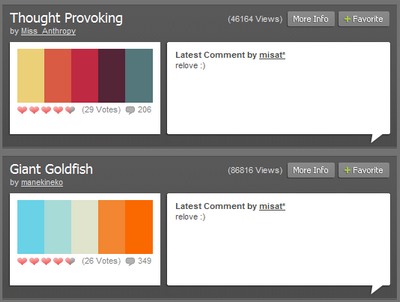
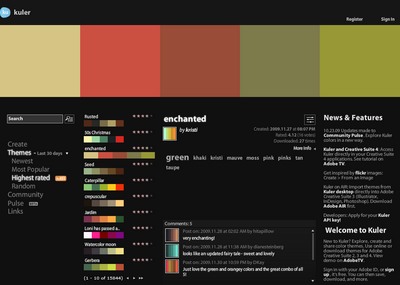
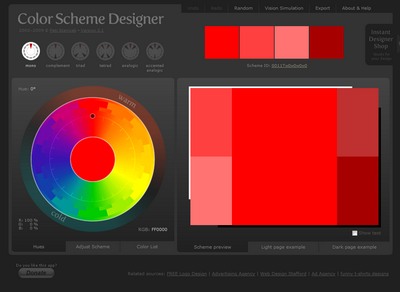
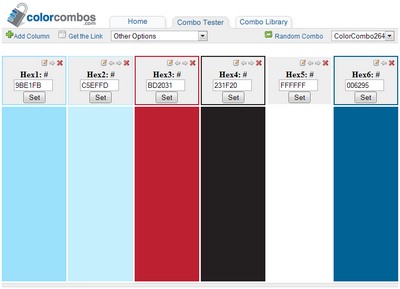
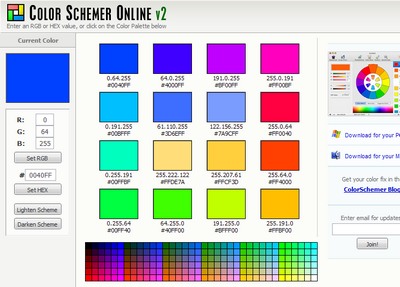



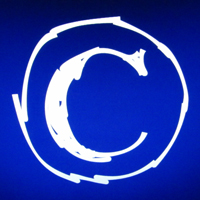


Thanks for the kind words. Just wanted to make sure you’ve seen our advanced palette maker too: http://colourlovers.com/copaso
(P.S. We’re working on that speed issue too)
( 2 years and 4955 days ago )+D